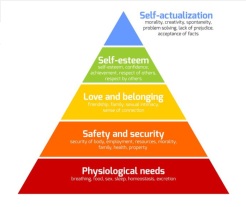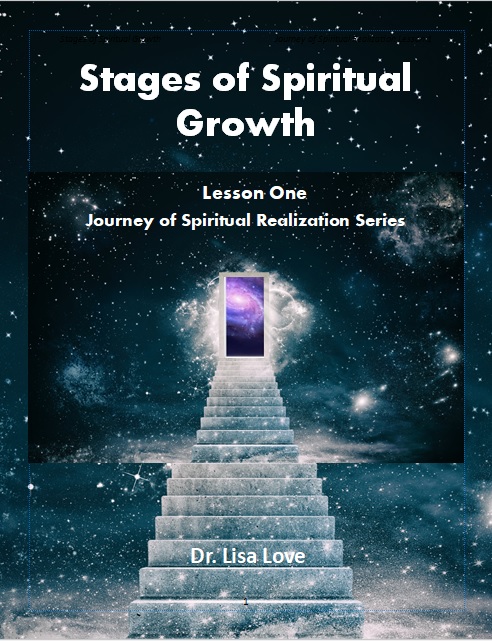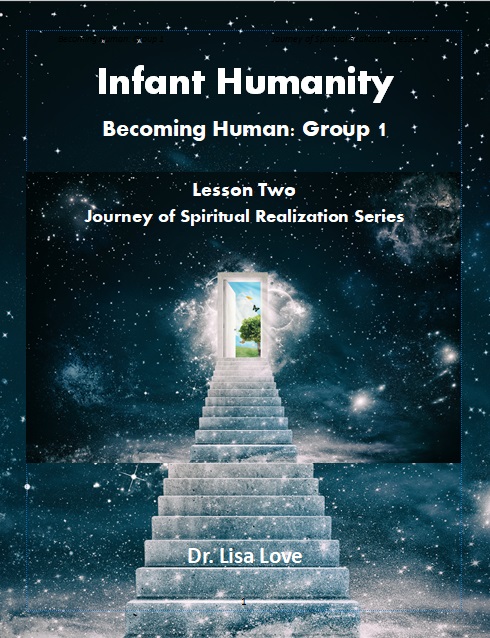This post begins to describe the characteristics of Bailey’s Group Four, which is dominated by what she calls Atlantean consciousness, Topics discussed include: Struggle to Lead More Stable Lives, Bonded and Connected, Conformity to Norms, and Following Leaders
GROUP FOUR
So what are the general characteristics Group Four? In Esoteric Psychology, Vol II, p. 205 we are told that they are primarily emotional in nature (which corresponds with them being Atlantean). Though they have more mind present than Group Three does, their minds still are said not to function very strongly. Though their focus on the physical plane diminishes, it is not because they ignore Physical Plane life. It is because Group Four Salmon people are much more able to get their physiological and survival needs met meaning they don’t have to put their conscious attention there as much. This frees them up to focus more their desires, their relationships and the cultivation of their emotions. Let’s explore this more.
Main Developmental Themes
- Lead More Stable Lives
- Bonded and Connected
- Conforming to Norms
- Following Leaders
- Fulfilling Desires
- Constant Craving
- Relying Too Much on Luck
- Vulnerable to Exploitative Ideologies
- Easily Distracted
Lead More Stable Lives

Looking again at Maslow’s Hierarchy of Needs (which was created decades after the Alice Bailey model), we discover that the Physiological Needs (breathing, food, sex, sleep, homeostasis, excretion) that are so essential for Groups One & Two are finally being taken care of by Group Four. As for the Safety and Security needs (security of body, employment, resources, morality, family, health, and property), because those in Group Four are not as impulsive as Group Three members are and can plan better, they are way more likely to get these Safety and Security needs met. The in crease in cognitive abilities found in Group Four also allowed them to do things like invent agriculture, allowing them to settle down more. Because they are better planners they also know how to store up resources increasing the likelihood that they survive even through difficult periods, improve their health, accumulation of land and property, and even live a lot longer.
In short, as Group Four becomes more stable and settled, they don’t want to pick up their weapons and run off and fight some battle in some far away place in some pointless pursuit of glory. They don’t want to go off and get hacked to bits. They simply don’t need to. They have enough food, clothing, and shelter to get by on already. Plus, they have land to watch over, animals to take care of, and nice little cottages to maintain. If they are lucky they may even manage to get to know each other better, since their family members are a little less likely to die off as early as they did before. In many ways they are a like the Hobbits from the Lord of the Rings books. Given a choice, they would rather just stay home.
GROUP FOUR THEMES: Seeking stability, bonded and connected, conforming to norms, following leaders
Bonded & Connected

Which brings me to the next level of Maslow’s Hierarchy of Needs, Love and Belonging which Maslow describes as friendships, family, sexual intimacy, and sense of connection. Actually, I prefer the word bonding more than love here. As we shall see later in this book there is a lot more to love than what is found within Group Four’s awareness. But, for love to even begin to happen there needs to be a sense of connection. These connection deepen if you can stay at home, live longer, and have more time to bond and be together.
True, Group Three Red members may have bonded somewhat. But, it is hard to bond and want to get too connected when your children and wives are dying young, and most of the men you know are getting killed and hacked up in battle. No wonder Group Three “alpha males” needed so much testosterone. As we now know high levels of testosterone inhibit the production of oxytocin, which is the bonding hormone. Even today the high levels of testosterone Group Three like “alpha males” possess, makes it difficult for them to want to settle down. But Group Four changes all of this. Now, babies and wives are no longer as prone to die during childbirth. Men you know are less likely to go into battle and get killed. Because everyone tends to live longer, husbands and wives and parents and children can all get to know each other. Even more miraculous, children may even get to know their grandparents and vice versa. All this time together allows for deeper connections to get fostered. People become familiar with one another (a word that is connected to family).
I even believe this opportunity to have a greater sense of connection, familiarity and bonding is what shifted human’s sexual impulses away from having multiple partners and more towards monogamy. Even today where some are once again pushing the notion of having multiple sexual partners (known as polyamory), there is growing awareness of how difficult that lifestyle can be. They are beginning to see why Group Four people started to leave the idea of multiple sexual partners behind. After all it is easy to be polyamorous if you don’t get too bonded, too connected, or have to go too deep with your sexual partners. As Group Four members discovered, when you feel more bonded and connected to someone having to break those bonds is just too painful. That is why monogamy, or even serial monogamy, is still most people’s preferred choice. Monogamy also has other advantages, like not having to spend so much of your time seeking out new sexual partners. Or, being able to be more sure if you are man, that you really are the father of your own children. Or, not having to split up what you acquire during a divorce, or having to share what you earn with a lot of other people who now want you to support them. Having fewer people that you have sex with also helps you go deeper in a relationship and allows you to become more sexually intimate. Fewer sexual partners in the mix also makes it easier to have dialogue, build trust, and figure out what to expect from each other.
Even at a biological level science is beginning to discover that though polyamory may be a great choice if you are a Group Three person who doesn’t get bonded with others too much, it is not so great an option if you have shifted into Group Four! Why? Because increasingly they are discovering more “bridge-brain” males are being born. These are men who have lower degrees of testosterone and higher levels of oxytocin (again the bonding hormone). Like women, who have always had higher levels of oxytocin, more men are finding out what women have always known. Even at a biological level when the oxytocin bond breaks, it really hurts! Why? Because scientific research has revealed that high levels of oxytocin are released during orgasm, which even when we have sex with a total stranger, tends to get us hooked on them. If a man has a lot of testosterone, that oxytocin will disappear within only a few hours (about the time we wakes up from his nap after he is done having sex). For women, that oxytocin can remain in their system for days or even weeks. Maybe that is one reason “women get so crazy” after sex (as some men used to tell me) if the man doesn’t want to see her again. You see we now know that if the oxytocin bonds you with someone, and that bond breaks too quickly, then people who got a heavy oxytocin hit (like women), will suddenly have their brain mitigate that oxytocin by dumping a lot of cortisol into system. What does cortisol do? Mainly it just plummets you into fatigue, depression, and overwhelming feelings of anxiety. Or, it can create cognitive difficulties, prematurely age you, and give you excessive carbohydrate cravings. Ice cream anyone?
GROUP FOUR THEMES: Attempting to bond and coordinate family life, trying to set norms to create stability
Conforming to Norms

So how do you prevent the breaking of bonds that Group Four people have discovered can lead to emotional, biological and even societal and financial distress? You create norms. Remember, Group Four people don’t want to go back to the greater likelihood of scarcity, insecurity, instability, violence, and war experienced much more by people whose consciousness is still at Group Three. They want people within relationships, families and communities to stick together. They want to know that the property and possessions they worked so hard to get could go to people they care about when they pass away, like their children who are now living longer. Men want to be pretty certain that a child is theirs so when they spend most of their time and energy trying to provide for them, they have done so for the right reasons. And, women don’t want to “go crazy” by creating bonds that are constantly broken by high testosterone men who aren’t inclined to settle down, or keep the romantic promises they made because they are too impulsive and restless too. And, parents don’t want their children to die young of childhood diseases they get exposed to because everyone has to roam around from place to place to find food. If their children grow up parents (and frequently the children) don’t want to be sent off to war to get mutilated or die in battle. And, no one wants to go back to the days when women and children often died during childbirth. I mean why would anyone want to go back to a Group Three way of living? They must be nuts!
To prevent the instability and insecurity that Group Three tends to live in from returning, Group Four members used their growing intelligence and awareness to create rules, standards and norms for living. And, no rules aren’t meant to be broken (the way Group Three people like to do). Rules are meant to be followed! Rules bring about stability and help you know from generation to generation what to expect. Rules help people keep agreements, provide a sense of fairness, and help establish trust. Trust leads to an increased sense of familiarity and intimacy. Familiarity and intimacy inclines people to help each other more and keep their agreements. When people help each other and keep their agreements, there is less need for war. When there is less war there is more stability and less stress. Less stress helps everyone to mentally evolve. As everyone evolves they become more curious about other people and the environment around them. That curiosity helps open the door to greater mental exploration, which in turn leads to asking deeper and more philosophical questions about the nature of life and the universe. As you answer these questions to a satisfactory level you have a greater sense of security and even peace of mind. No wonder members of Group Four get so preoccupied with coming up with the right set of rules, guidelines, and morals.
As you can see there are many advantages to the way Group Four norms operate. As a member of Group Four if you follow the rules, adhere to the norms, maintain your behavior within the prescribed set of morals, then your family, group, society, or culture will reward you. You will even be labeled as “good.” But, if you break the rules because they are too hard to follow or don’t really suit you, then you become “bad” and run the risk of being ostracized or viewed as an outsider. Being an outsider can feel like a dangerous place to be. That is why though some people who feel stifled by Group Four norms may look with admiration and envy towards the Group Three rebels, in the long run conformity, not rebellion, now becomes the new norm.
GROUP FOUR THEMES: Shifting from rebellion into valuing discipline and norms, learning to bond and connect
Following Leaders

Yes, I have picked a wombat as a spiritual leader in the picture to the right here. Why? Because those in Group Four are still fairly tribal, their tribes are just larger. And, none of them like to be offended by anyone saying or insinuating anything negative about their particular religious group or spiritual leader. Unlike with Group Three who prefer strong (mainly) men to lead them who are especially adept at being aggressive and even violent if they have to be, Group Four people want their leaders (still mainly men) to be moral. Strong and moral would even be better! But, who decides what morality looks like? Well, mainly Group Five and Six people do, but we have yet to get to them.
As for Group Four, they still want to follow leaders, so long as they play somewhat by the rules, be “nice”, and for the most part stay true to their word and agreements. It also helps if their leaders seem to be “good” and inspire members of Group Four to do things for a “good cause” increasing the likelihood that they will get what they want (here or elsewhere in heaven), because they have been more “good” than other people around them. That puts an a lot of stress on trying to discover what good is, especially if you start to attach something like an eternal afterlife into the equation of goodness.
So how do you know what good is? You look to your religious leaders to tell you. This is a different strategy from Group Two’s use of a magician or a shaman. It didn’t matter if a shaman was a “good” person, or even if you were. What mattered was, did the magic or spell the shaman used word? Group Four people know too often that magic or spell didn’t do what it was supposed to do. So, maybe being good will help. The problem is one religions idea of what means you are a good and moral person doesn’t always look the same as the others. In Judaism you can’t eat pork. In the Protestant faith you can have all the pork you want. In some Indian religious systems you can’t eat garlic and onion. In other faiths both are considered good for you. Most religious faiths will tell you that only if you read this book, or follow this teaching, walk this spiritual path, or accept only this spiritual teacher will you become “truly” good, and get to the right sort of heaven. All of this makes it pretty risky to cross the line and follow another faith, or be open to other ideas people may have of “goodness.” Worse, should you decide to cross the line and consider another faith, or follow another teaching or spiritual teacher, you run the risk of not only being cut off from your spiritual community and family, you risk going through an eternity in hell.
All of this puts Group Four members in a unique sort of bind. Because once you get in a certain group (religious or otherwise), it is pretty hard to get out of it without potentially suffering dire consequences. Hopefully, you have fallen in with, or chosen, a culture, religious group, political leader who won’t steer you wrong. Sadly, Group Four types are fairly prone to getting duped and swayed by leaders, especially demagogues, who hype them with promises, that in the long run don’t quite turn out so well. But, because it is so risky to rebel, and the need to be loyal and conform is so strong, even if they discover they are duped, they may be afraid to do anything about it. The pain and fear of becoming an outcast, being bullied, not belonging, or spending an eternity in hell just shuts them down. Compound this with the tactics of fear that Group Three, Group Five and even Group Six types impose upon Group Four, it is easy to see why they often believe they just don’t have choice except to go along.
Which leads us to the saddest thing about those in Group Four. And, that is how those in authority over them may be promising them with one hand (like a feeling of safety, economic security, a sense of belonging and a promise of a happy life either in the here and now or in the hereafter), while removing things from them on the other hand (like access to better wages, health insurance, education, and civil liberties that may give those in Group Four too much power in comparison to those who seek to rule over them). Just look at the history of slavery and serfdom (a type of slavery) and ask the question why so many of them didn’t rise up and demand that they get something better than their current raw deal? Or, consider in our modern times the shrinking middle class and why so many people continue to accept their increasingly marginalized existence. Next broaden your perspective and ask why it is that millions and maybe even billions of people put up with things like low and stagnant wages, long work hours, poor health insurance, and not much in the way of true political and social leverage. How is it that so many people sit there like sheep, allowing just a few other people to dominate over them?
GROUP FOUR THEMES: Following leaders who can be respected and hopefully will not lead others into danger.
Copyright © 2018 – 2020 by Lisa Love. All rights reserved. No part of this blog may be reproduced or transmitted in any form, or by any means, electronic or mechanical, including photocopy, recording, computer, or any information storage and retrieval system, without permission in writing from the author.



December 8, 2019 at 1:13 am
Wow that was strange. I just wrote an extremely long comment but after I clicked submit my comment didn’t appear. Grrrr… well I’m not writing all that over again. Regardless, just wanted to say wonderful blog!
LikeLike